Supreme Court Case Study: AGL Energy v Jemena Gas Networks (NSW) Ltd
VerifiedAdded on 2020/05/11
|6
|1274
|194
Case Study
AI Summary
This case study analyzes the Supreme Court of New South Wales case, AGL Energy Limited v Jemena Gas Networks (NSW) Ltd, focusing on a dispute arising from Reference Service Agreements. Jemena was obligated to provide gas meter readings to AGL, leading to a disagreement over timely readings and gas quantity information. The core issue was whether clause 30.5(a) of the agreement mandated arbitration. The court, referencing the Commercial Arbitration Act 2010 and prior cases, determined that the clause did not constitute a binding arbitration agreement, emphasizing the need for clear and unambiguous language in arbitration clauses, especially within multi-tiered dispute resolution processes. The case highlights the differences between arbitration and litigation, their advantages and disadvantages, and serves as a reminder for commercial parties to draft clear arbitration clauses. The analysis includes questions and answers, exploring the court's reasoning, the distinction between arbitration and litigation, and the implications of the case on the requirement of compulsory arbitration. The assignment also includes a bibliography of books, cases, and legislations.
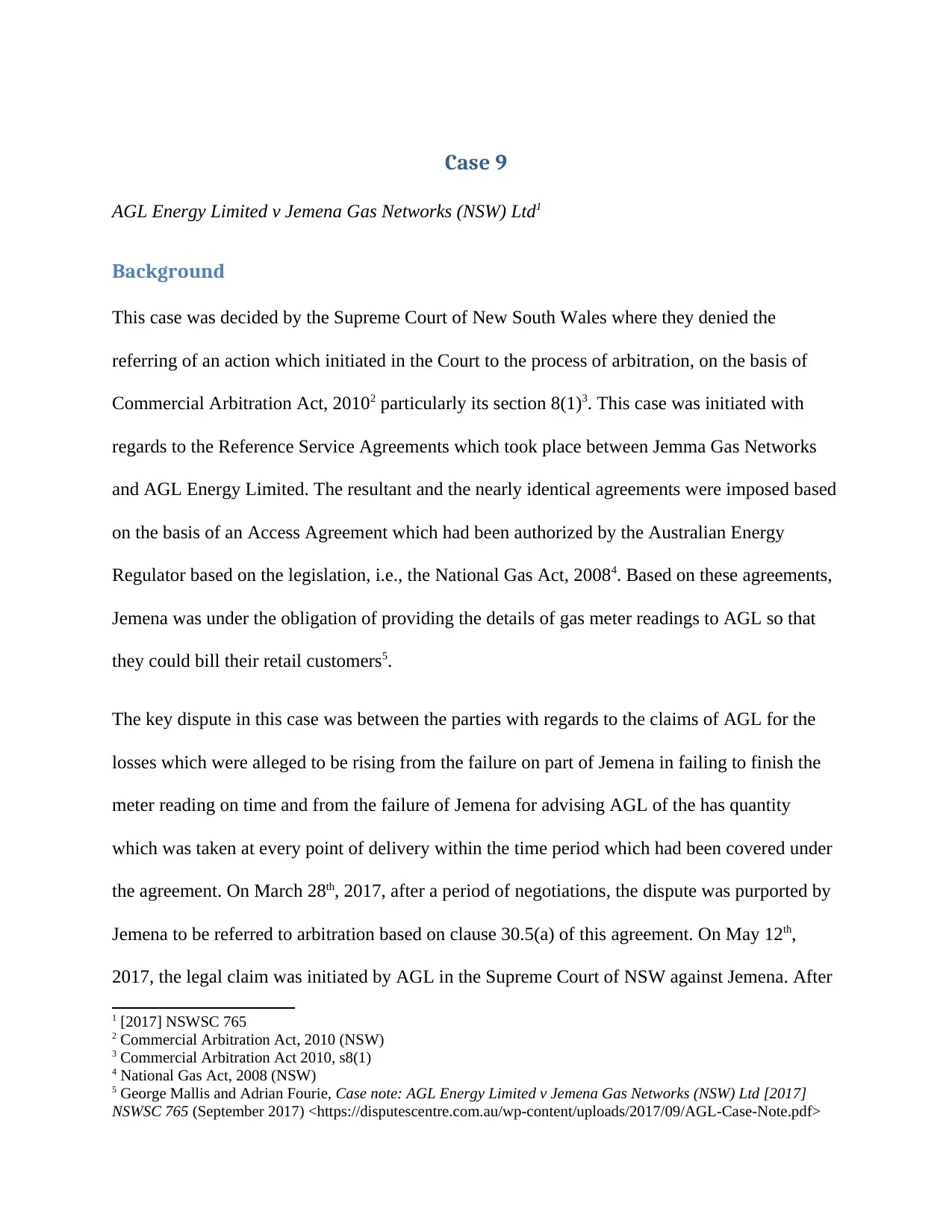
Case 9
AGL Energy Limited v Jemena Gas Networks (NSW) Ltd1
Background
This case was decided by the Supreme Court of New South Wales where they denied the
referring of an action which initiated in the Court to the process of arbitration, on the basis of
Commercial Arbitration Act, 20102 particularly its section 8(1)3. This case was initiated with
regards to the Reference Service Agreements which took place between Jemma Gas Networks
and AGL Energy Limited. The resultant and the nearly identical agreements were imposed based
on the basis of an Access Agreement which had been authorized by the Australian Energy
Regulator based on the legislation, i.e., the National Gas Act, 20084. Based on these agreements,
Jemena was under the obligation of providing the details of gas meter readings to AGL so that
they could bill their retail customers5.
The key dispute in this case was between the parties with regards to the claims of AGL for the
losses which were alleged to be rising from the failure on part of Jemena in failing to finish the
meter reading on time and from the failure of Jemena for advising AGL of the has quantity
which was taken at every point of delivery within the time period which had been covered under
the agreement. On March 28th, 2017, after a period of negotiations, the dispute was purported by
Jemena to be referred to arbitration based on clause 30.5(a) of this agreement. On May 12th,
2017, the legal claim was initiated by AGL in the Supreme Court of NSW against Jemena. After
1 [2017] NSWSC 765
2 Commercial Arbitration Act, 2010 (NSW)
3 Commercial Arbitration Act 2010, s8(1)
4 National Gas Act, 2008 (NSW)
5 George Mallis and Adrian Fourie, Case note: AGL Energy Limited v Jemena Gas Networks (NSW) Ltd [2017]
NSWSC 765 (September 2017) <https://disputescentre.com.au/wp-content/uploads/2017/09/AGL-Case-Note.pdf>
AGL Energy Limited v Jemena Gas Networks (NSW) Ltd1
Background
This case was decided by the Supreme Court of New South Wales where they denied the
referring of an action which initiated in the Court to the process of arbitration, on the basis of
Commercial Arbitration Act, 20102 particularly its section 8(1)3. This case was initiated with
regards to the Reference Service Agreements which took place between Jemma Gas Networks
and AGL Energy Limited. The resultant and the nearly identical agreements were imposed based
on the basis of an Access Agreement which had been authorized by the Australian Energy
Regulator based on the legislation, i.e., the National Gas Act, 20084. Based on these agreements,
Jemena was under the obligation of providing the details of gas meter readings to AGL so that
they could bill their retail customers5.
The key dispute in this case was between the parties with regards to the claims of AGL for the
losses which were alleged to be rising from the failure on part of Jemena in failing to finish the
meter reading on time and from the failure of Jemena for advising AGL of the has quantity
which was taken at every point of delivery within the time period which had been covered under
the agreement. On March 28th, 2017, after a period of negotiations, the dispute was purported by
Jemena to be referred to arbitration based on clause 30.5(a) of this agreement. On May 12th,
2017, the legal claim was initiated by AGL in the Supreme Court of NSW against Jemena. After
1 [2017] NSWSC 765
2 Commercial Arbitration Act, 2010 (NSW)
3 Commercial Arbitration Act 2010, s8(1)
4 National Gas Act, 2008 (NSW)
5 George Mallis and Adrian Fourie, Case note: AGL Energy Limited v Jemena Gas Networks (NSW) Ltd [2017]
NSWSC 765 (September 2017) <https://disputescentre.com.au/wp-content/uploads/2017/09/AGL-Case-Note.pdf>
Paraphrase This Document
Need a fresh take? Get an instant paraphrase of this document with our AI Paraphraser
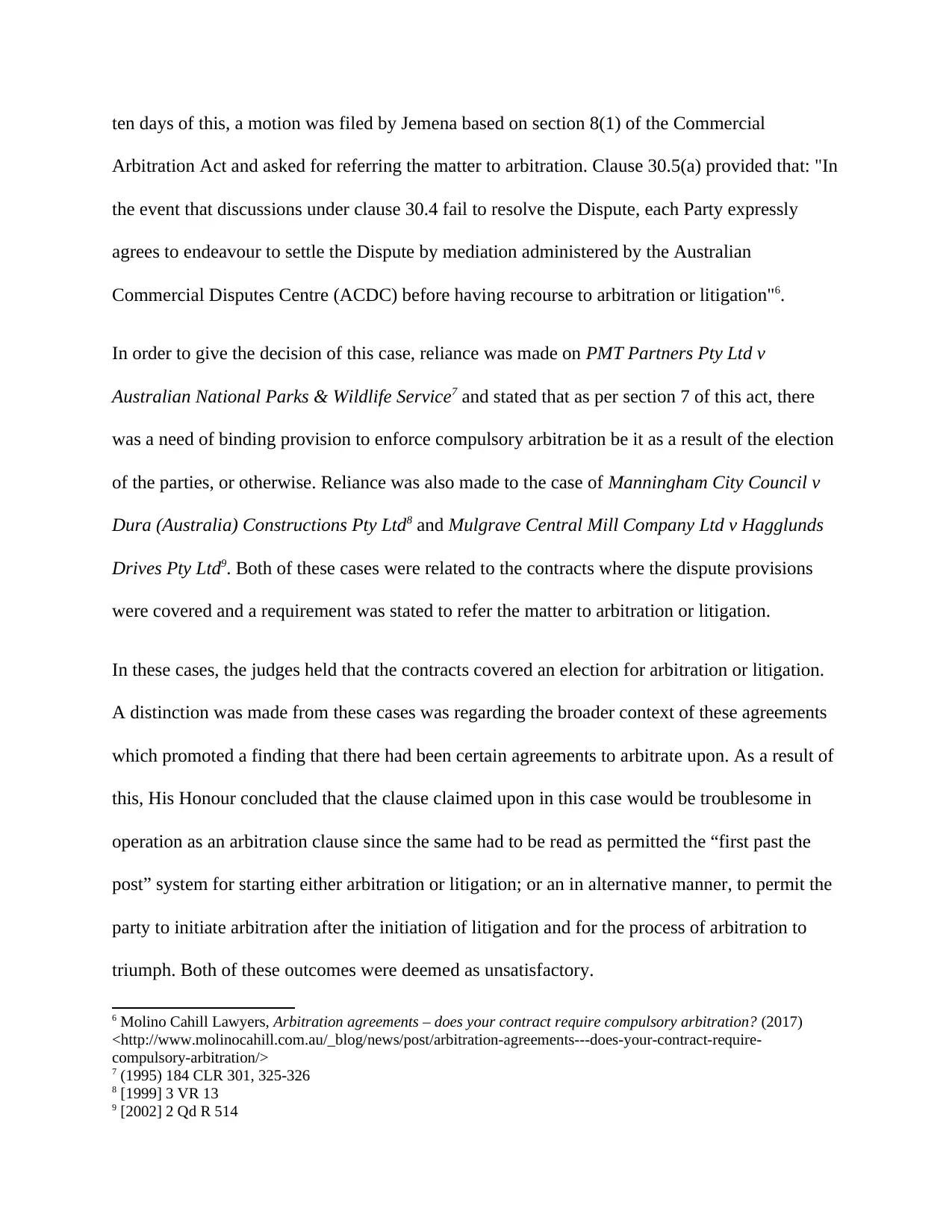
ten days of this, a motion was filed by Jemena based on section 8(1) of the Commercial
Arbitration Act and asked for referring the matter to arbitration. Clause 30.5(a) provided that: "In
the event that discussions under clause 30.4 fail to resolve the Dispute, each Party expressly
agrees to endeavour to settle the Dispute by mediation administered by the Australian
Commercial Disputes Centre (ACDC) before having recourse to arbitration or litigation"6.
In order to give the decision of this case, reliance was made on PMT Partners Pty Ltd v
Australian National Parks & Wildlife Service7 and stated that as per section 7 of this act, there
was a need of binding provision to enforce compulsory arbitration be it as a result of the election
of the parties, or otherwise. Reliance was also made to the case of Manningham City Council v
Dura (Australia) Constructions Pty Ltd8 and Mulgrave Central Mill Company Ltd v Hagglunds
Drives Pty Ltd9. Both of these cases were related to the contracts where the dispute provisions
were covered and a requirement was stated to refer the matter to arbitration or litigation.
In these cases, the judges held that the contracts covered an election for arbitration or litigation.
A distinction was made from these cases was regarding the broader context of these agreements
which promoted a finding that there had been certain agreements to arbitrate upon. As a result of
this, His Honour concluded that the clause claimed upon in this case would be troublesome in
operation as an arbitration clause since the same had to be read as permitted the “first past the
post” system for starting either arbitration or litigation; or an in alternative manner, to permit the
party to initiate arbitration after the initiation of litigation and for the process of arbitration to
triumph. Both of these outcomes were deemed as unsatisfactory.
6 Molino Cahill Lawyers, Arbitration agreements – does your contract require compulsory arbitration? (2017)
<http://www.molinocahill.com.au/_blog/news/post/arbitration-agreements---does-your-contract-require-
compulsory-arbitration/>
7 (1995) 184 CLR 301, 325-326
8 [1999] 3 VR 13
9 [2002] 2 Qd R 514
Arbitration Act and asked for referring the matter to arbitration. Clause 30.5(a) provided that: "In
the event that discussions under clause 30.4 fail to resolve the Dispute, each Party expressly
agrees to endeavour to settle the Dispute by mediation administered by the Australian
Commercial Disputes Centre (ACDC) before having recourse to arbitration or litigation"6.
In order to give the decision of this case, reliance was made on PMT Partners Pty Ltd v
Australian National Parks & Wildlife Service7 and stated that as per section 7 of this act, there
was a need of binding provision to enforce compulsory arbitration be it as a result of the election
of the parties, or otherwise. Reliance was also made to the case of Manningham City Council v
Dura (Australia) Constructions Pty Ltd8 and Mulgrave Central Mill Company Ltd v Hagglunds
Drives Pty Ltd9. Both of these cases were related to the contracts where the dispute provisions
were covered and a requirement was stated to refer the matter to arbitration or litigation.
In these cases, the judges held that the contracts covered an election for arbitration or litigation.
A distinction was made from these cases was regarding the broader context of these agreements
which promoted a finding that there had been certain agreements to arbitrate upon. As a result of
this, His Honour concluded that the clause claimed upon in this case would be troublesome in
operation as an arbitration clause since the same had to be read as permitted the “first past the
post” system for starting either arbitration or litigation; or an in alternative manner, to permit the
party to initiate arbitration after the initiation of litigation and for the process of arbitration to
triumph. Both of these outcomes were deemed as unsatisfactory.
6 Molino Cahill Lawyers, Arbitration agreements – does your contract require compulsory arbitration? (2017)
<http://www.molinocahill.com.au/_blog/news/post/arbitration-agreements---does-your-contract-require-
compulsory-arbitration/>
7 (1995) 184 CLR 301, 325-326
8 [1999] 3 VR 13
9 [2002] 2 Qd R 514
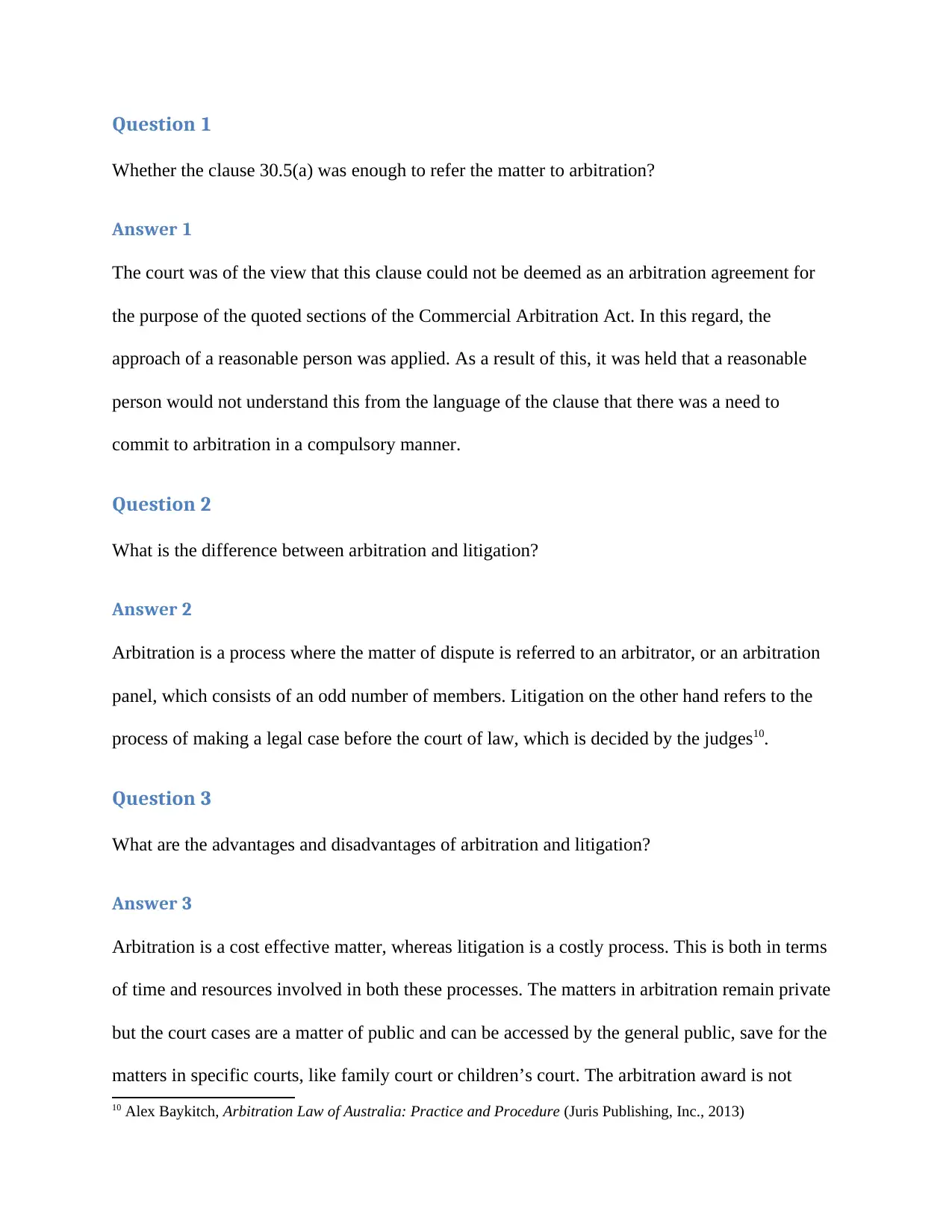
Question 1
Whether the clause 30.5(a) was enough to refer the matter to arbitration?
Answer 1
The court was of the view that this clause could not be deemed as an arbitration agreement for
the purpose of the quoted sections of the Commercial Arbitration Act. In this regard, the
approach of a reasonable person was applied. As a result of this, it was held that a reasonable
person would not understand this from the language of the clause that there was a need to
commit to arbitration in a compulsory manner.
Question 2
What is the difference between arbitration and litigation?
Answer 2
Arbitration is a process where the matter of dispute is referred to an arbitrator, or an arbitration
panel, which consists of an odd number of members. Litigation on the other hand refers to the
process of making a legal case before the court of law, which is decided by the judges10.
Question 3
What are the advantages and disadvantages of arbitration and litigation?
Answer 3
Arbitration is a cost effective matter, whereas litigation is a costly process. This is both in terms
of time and resources involved in both these processes. The matters in arbitration remain private
but the court cases are a matter of public and can be accessed by the general public, save for the
matters in specific courts, like family court or children’s court. The arbitration award is not
10 Alex Baykitch, Arbitration Law of Australia: Practice and Procedure (Juris Publishing, Inc., 2013)
Whether the clause 30.5(a) was enough to refer the matter to arbitration?
Answer 1
The court was of the view that this clause could not be deemed as an arbitration agreement for
the purpose of the quoted sections of the Commercial Arbitration Act. In this regard, the
approach of a reasonable person was applied. As a result of this, it was held that a reasonable
person would not understand this from the language of the clause that there was a need to
commit to arbitration in a compulsory manner.
Question 2
What is the difference between arbitration and litigation?
Answer 2
Arbitration is a process where the matter of dispute is referred to an arbitrator, or an arbitration
panel, which consists of an odd number of members. Litigation on the other hand refers to the
process of making a legal case before the court of law, which is decided by the judges10.
Question 3
What are the advantages and disadvantages of arbitration and litigation?
Answer 3
Arbitration is a cost effective matter, whereas litigation is a costly process. This is both in terms
of time and resources involved in both these processes. The matters in arbitration remain private
but the court cases are a matter of public and can be accessed by the general public, save for the
matters in specific courts, like family court or children’s court. The arbitration award is not
10 Alex Baykitch, Arbitration Law of Australia: Practice and Procedure (Juris Publishing, Inc., 2013)
⊘ This is a preview!⊘
Do you want full access?
Subscribe today to unlock all pages.

Trusted by 1+ million students worldwide
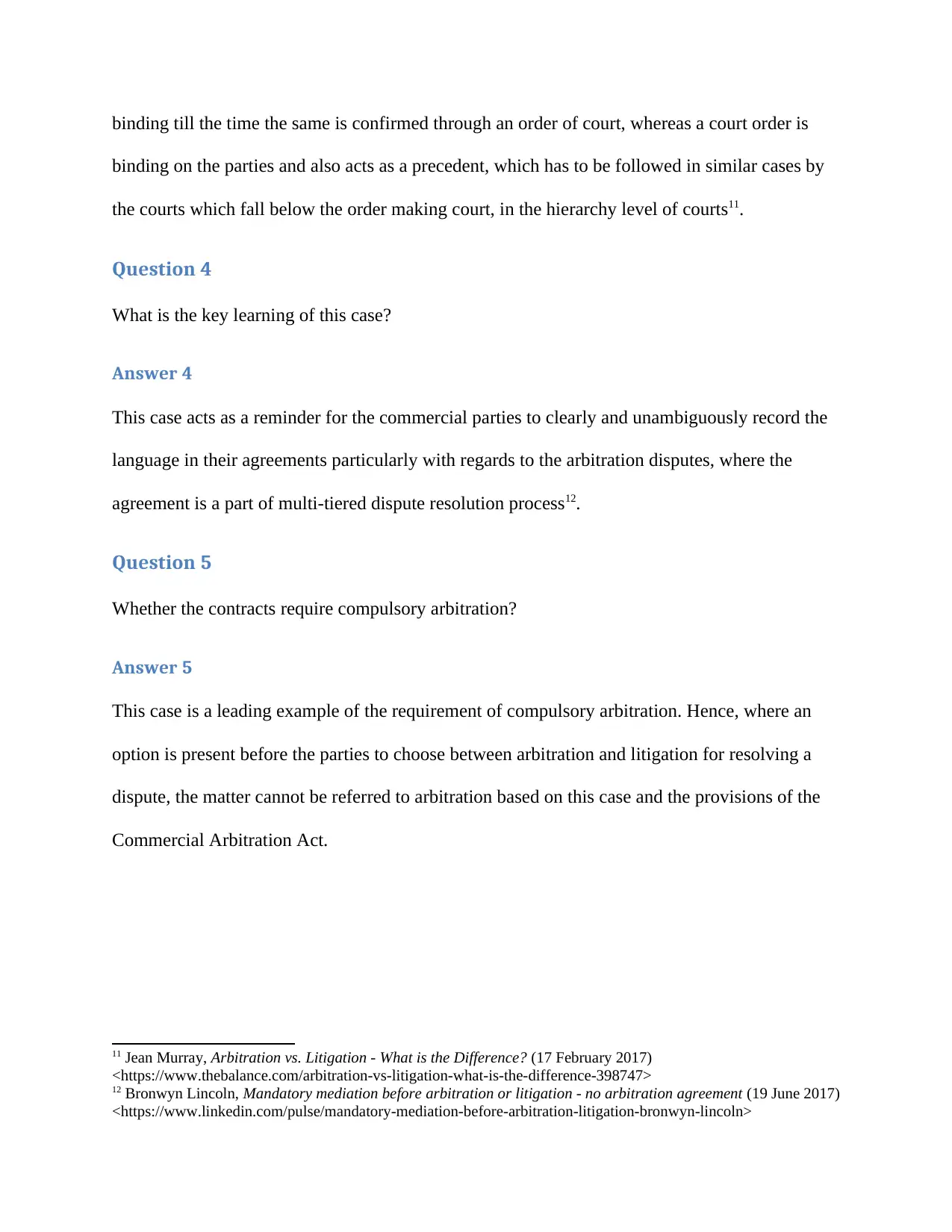
binding till the time the same is confirmed through an order of court, whereas a court order is
binding on the parties and also acts as a precedent, which has to be followed in similar cases by
the courts which fall below the order making court, in the hierarchy level of courts11.
Question 4
What is the key learning of this case?
Answer 4
This case acts as a reminder for the commercial parties to clearly and unambiguously record the
language in their agreements particularly with regards to the arbitration disputes, where the
agreement is a part of multi-tiered dispute resolution process12.
Question 5
Whether the contracts require compulsory arbitration?
Answer 5
This case is a leading example of the requirement of compulsory arbitration. Hence, where an
option is present before the parties to choose between arbitration and litigation for resolving a
dispute, the matter cannot be referred to arbitration based on this case and the provisions of the
Commercial Arbitration Act.
11 Jean Murray, Arbitration vs. Litigation - What is the Difference? (17 February 2017)
<https://www.thebalance.com/arbitration-vs-litigation-what-is-the-difference-398747>
12 Bronwyn Lincoln, Mandatory mediation before arbitration or litigation - no arbitration agreement (19 June 2017)
<https://www.linkedin.com/pulse/mandatory-mediation-before-arbitration-litigation-bronwyn-lincoln>
binding on the parties and also acts as a precedent, which has to be followed in similar cases by
the courts which fall below the order making court, in the hierarchy level of courts11.
Question 4
What is the key learning of this case?
Answer 4
This case acts as a reminder for the commercial parties to clearly and unambiguously record the
language in their agreements particularly with regards to the arbitration disputes, where the
agreement is a part of multi-tiered dispute resolution process12.
Question 5
Whether the contracts require compulsory arbitration?
Answer 5
This case is a leading example of the requirement of compulsory arbitration. Hence, where an
option is present before the parties to choose between arbitration and litigation for resolving a
dispute, the matter cannot be referred to arbitration based on this case and the provisions of the
Commercial Arbitration Act.
11 Jean Murray, Arbitration vs. Litigation - What is the Difference? (17 February 2017)
<https://www.thebalance.com/arbitration-vs-litigation-what-is-the-difference-398747>
12 Bronwyn Lincoln, Mandatory mediation before arbitration or litigation - no arbitration agreement (19 June 2017)
<https://www.linkedin.com/pulse/mandatory-mediation-before-arbitration-litigation-bronwyn-lincoln>
Paraphrase This Document
Need a fresh take? Get an instant paraphrase of this document with our AI Paraphraser
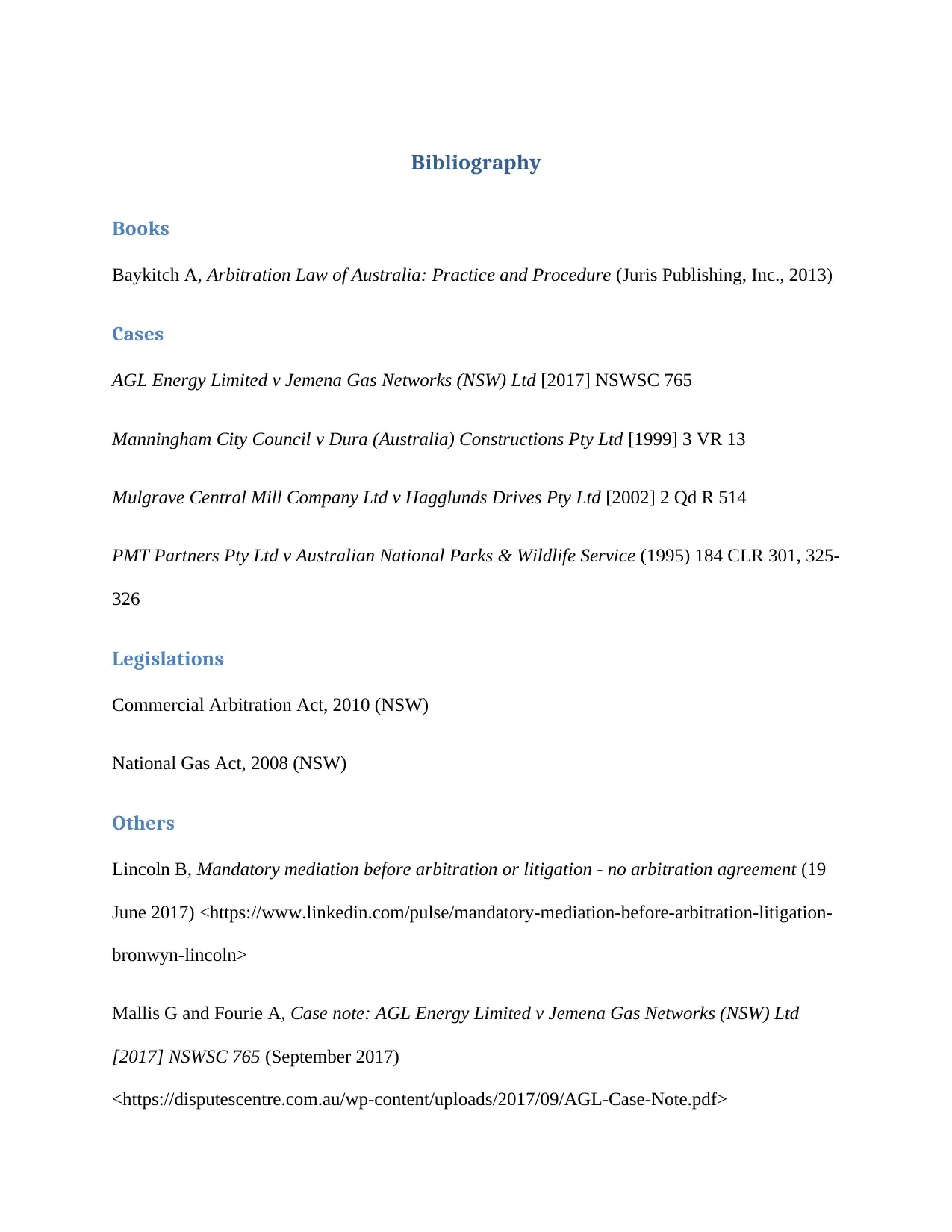
Bibliography
Books
Baykitch A, Arbitration Law of Australia: Practice and Procedure (Juris Publishing, Inc., 2013)
Cases
AGL Energy Limited v Jemena Gas Networks (NSW) Ltd [2017] NSWSC 765
Manningham City Council v Dura (Australia) Constructions Pty Ltd [1999] 3 VR 13
Mulgrave Central Mill Company Ltd v Hagglunds Drives Pty Ltd [2002] 2 Qd R 514
PMT Partners Pty Ltd v Australian National Parks & Wildlife Service (1995) 184 CLR 301, 325-
326
Legislations
Commercial Arbitration Act, 2010 (NSW)
National Gas Act, 2008 (NSW)
Others
Lincoln B, Mandatory mediation before arbitration or litigation - no arbitration agreement (19
June 2017) <https://www.linkedin.com/pulse/mandatory-mediation-before-arbitration-litigation-
bronwyn-lincoln>
Mallis G and Fourie A, Case note: AGL Energy Limited v Jemena Gas Networks (NSW) Ltd
[2017] NSWSC 765 (September 2017)
<https://disputescentre.com.au/wp-content/uploads/2017/09/AGL-Case-Note.pdf>
Books
Baykitch A, Arbitration Law of Australia: Practice and Procedure (Juris Publishing, Inc., 2013)
Cases
AGL Energy Limited v Jemena Gas Networks (NSW) Ltd [2017] NSWSC 765
Manningham City Council v Dura (Australia) Constructions Pty Ltd [1999] 3 VR 13
Mulgrave Central Mill Company Ltd v Hagglunds Drives Pty Ltd [2002] 2 Qd R 514
PMT Partners Pty Ltd v Australian National Parks & Wildlife Service (1995) 184 CLR 301, 325-
326
Legislations
Commercial Arbitration Act, 2010 (NSW)
National Gas Act, 2008 (NSW)
Others
Lincoln B, Mandatory mediation before arbitration or litigation - no arbitration agreement (19
June 2017) <https://www.linkedin.com/pulse/mandatory-mediation-before-arbitration-litigation-
bronwyn-lincoln>
Mallis G and Fourie A, Case note: AGL Energy Limited v Jemena Gas Networks (NSW) Ltd
[2017] NSWSC 765 (September 2017)
<https://disputescentre.com.au/wp-content/uploads/2017/09/AGL-Case-Note.pdf>
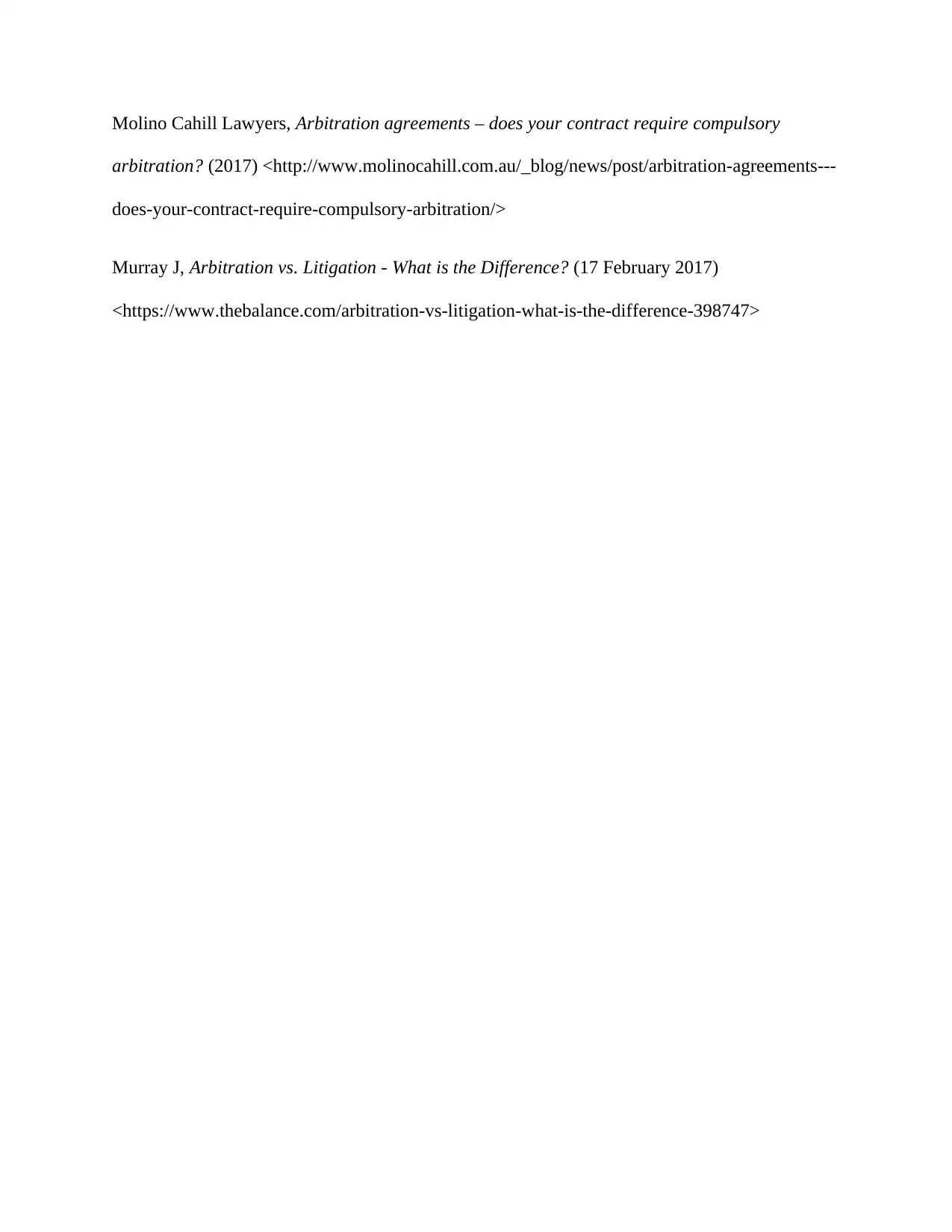
Molino Cahill Lawyers, Arbitration agreements – does your contract require compulsory
arbitration? (2017) <http://www.molinocahill.com.au/_blog/news/post/arbitration-agreements---
does-your-contract-require-compulsory-arbitration/>
Murray J, Arbitration vs. Litigation - What is the Difference? (17 February 2017)
<https://www.thebalance.com/arbitration-vs-litigation-what-is-the-difference-398747>
arbitration? (2017) <http://www.molinocahill.com.au/_blog/news/post/arbitration-agreements---
does-your-contract-require-compulsory-arbitration/>
Murray J, Arbitration vs. Litigation - What is the Difference? (17 February 2017)
<https://www.thebalance.com/arbitration-vs-litigation-what-is-the-difference-398747>
⊘ This is a preview!⊘
Do you want full access?
Subscribe today to unlock all pages.

Trusted by 1+ million students worldwide
1 out of 6
Related Documents
Your All-in-One AI-Powered Toolkit for Academic Success.
+13062052269
info@desklib.com
Available 24*7 on WhatsApp / Email
![[object Object]](/_next/static/media/star-bottom.7253800d.svg)
Unlock your academic potential
Copyright © 2020–2026 A2Z Services. All Rights Reserved. Developed and managed by ZUCOL.





